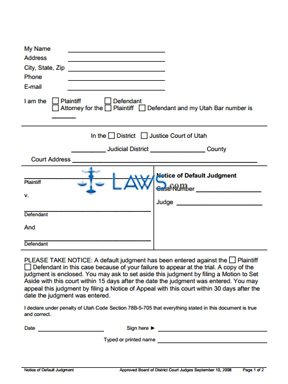

While this law might protect your entire bank balance, it has downsides. Can a creditor take money from my bank account in California?Ĭalifornia Protects Bank Balances Needed for SupportĪs of January 1, 2020, a creditor can’t seize any funds in a bank account that you need to pay for necessities of life, such as food, rent, utilities, and other living expenses. If the defendant doesn’t send back the form, the court will try to contact him or her, it could even issue an arrest warrant. The court will tell the defendant either to pay all the money owed or to fill in a form giving information about their income and outgoings, called a “statement of means”. What happens if someone doesn’t pay small claims court Judgement? Once issued, enforcement orders are generally valid for a year and may then be renewed. However, if the judgment order was issued 6 or more years earlier, the creditor may have to apply to court for leave to issue execution. How long do Judgements last?Ĭreditors have 12 years from the date of the judgment to look for enforcement orders. The court can ask about things like: your income and outgoings. It is something your creditors can ask for if they’ve already got a county court judgment (CCJ) against you and you aren’t sticking to it. Garnishee notice from your payroll department,Ĭan debt collectors ask for proof of income?.Letter in the mail or phone call from the collection attorneys,.

The most common ways you may find out that there are outstanding judgements against you are: How do you know if you have a Judgement against you?
Judgment proof full#
A judgment remains on your credit record for 5 years or until it is paid in full or a rescission is granted by the courts. What happens when you have a Judgement against you?Ī judgment is granted by the court when legal summons is issued and you fail to defend the summons or make payment of the amount claimed. A debtor rights attorney can also help you if you are already facing judgment. To prevent this from happening, the creditor must file a request for renewal of the judgment with the court BEFORE the 10 years run out.Ĭan a Judgement creditor take my car in California?Īlthough a judgment creditor can seize your property and vehicle against the debts you owe, you can protect yourself if you move fast and respond to the lawsuit. Money judgments automatically expire (run out) after 10 years. A debtor who is broke and unemployed can be considered judgment proof, as can a debtor who only has certain legally protected types of assets or income.ĭoes a Judgement ever go away in California? And, judgments are valid for ten years in California, can be renewed, and the interest is compounded on renewal.Judgment proof is a description of a person who does not have enough assets for a creditor to seize when a court order requires debt repayment. That way, if things do turn around for the debtor, you will be in a better position than if you had done nothing at all. Also, once you have a judgment you may take several actions to effectively, but passively, tie up property or at least establish your place in the line of creditors. You cannot wait forever to pursue a claim. That means pursuing your rights within the time limits provided by law. To protect your rights, however, it is important to take action. While payment plans may not have the same appeal as a lump sum payment in full, it may be the practical answer. As their circumstances change then they may want to pay what they owe or other assets may become available for satisfying the judgment.Īnother important thing to remember in collections is that often debts are resolved with payments over time. People may get a better job, inherit something, get married, etc. I do not believe most people want to live that lifestyle if they do not have to. The good news, however, is that being judgment proof is usually a temporary situation. If the defendant or debtor has nothing or keeps his or her money and property under the exemption amounts, it may be very difficult or even impossible to collect. In addition, there are laws that exempt certain kinds and amounts of money or property from enforcement of judgment. The term "judgment proof" or "collection proof" usually refer to a situation where the defendant/debtor has too little money or property to pay what they owe. If the defendant or debtor is judgment proof, why bother? People often wonder if it makes sense to pursue a claim through the court system or whether or not to try to enforce a judgment once they win their case.


 0 kommentar(er)
0 kommentar(er)
